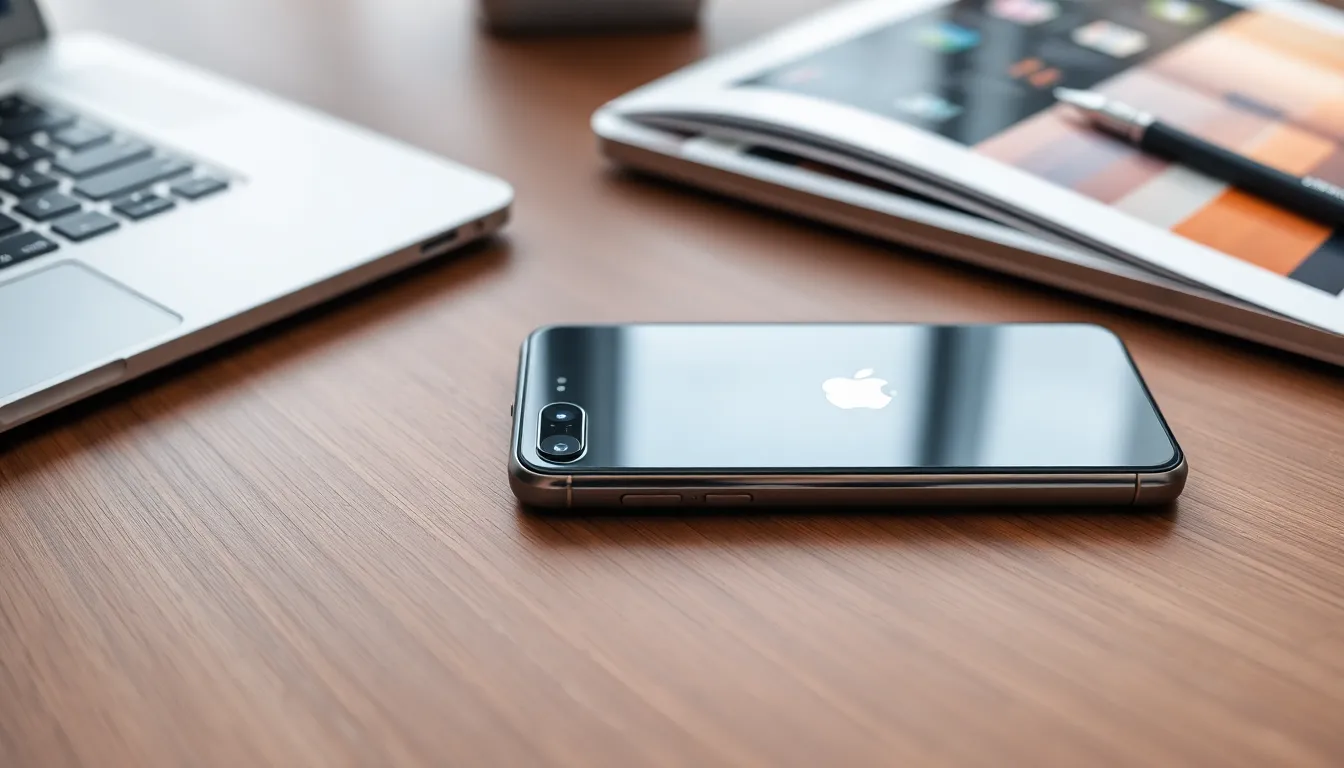In a world where smartphones reign supreme, iOS phones stand out like a unicorn in a herd of horses. With their sleek designs and user-friendly interfaces, they’ve become the go-to choice for tech enthusiasts and casual users alike. Whether it’s the latest iPhone or a trusty older model, these devices promise a seamless experience that keeps users coming back for more.
But let’s be honest—it’s not just about the shiny exterior. iOS phones come packed with features that can make even the most mundane tasks feel like a high-stakes mission. From intuitive apps to top-notch security, they’ve got it all. So, if you’re ready to dive into the world of iOS, buckle up! You’re in for a ride that’s as entertaining as it is efficient.
Table of Contents
ToggleOverview of iOS Phones
iOS phones, primarily the iPhone series, represent a significant segment of the smartphone market. Apple manufactures these devices, integrating hardware and software for optimized performance. Users appreciate the consistent updates that enhance security and functionality across different models.
Design plays a critical role in user engagement. Sleek aesthetics and premium materials contribute to the visual appeal, while ergonomic considerations improve usability. Features such as Face ID and the Retina display elevate the overall experience for both casual users and tech aficionados.
Underneath the polished exterior lies a robust ecosystem. The App Store provides access to millions of applications, ensuring a diverse range of tools for productivity, entertainment, and communication. Developers enjoy the extensive market reach, contributing to the active development of iOS applications.
Performance capabilities stand out among competitors. Apple’s A-series chips deliver superior speed and efficiency, enabling smooth multitasking and graphics-intensive applications. Battery life remains a focus, with many users enjoying all-day usage from their devices.
Lastly, accessories and integration enhance the overall experience. From AirPods to Apple Watch, the seamless connectivity between devices simplifies users’ lives. The continuity features allow smooth transitions between iPhone, iPad, and Mac, fostering an integrated digital lifestyle.
Overall, iOS phones blend style, functionality, and an interconnected ecosystem. Their combination of advanced technology and user-friendly experience positions them favorably in the rapidly changing smartphone landscape.
Key Features of iOS Phones

iOS phones, notably the iPhone series, come with distinctive features that enhance usability and performance.
User Interface and Experience
Designed for simplicity, the user interface of iOS phones promotes intuitive navigation. Touch gestures provide fluid interactions, allowing access to apps and settings effortlessly. Icons and menus maintain consistency across devices, fostering a learning curve that minimizes with experience. Customization options are available, enabling users to tailor their home screens to fit personal preferences. Additionally, accessibility features ensure inclusivity for users with varying needs, enhancing overall user satisfaction.
Ecosystem Integration
Integration within the Apple ecosystem is a key advantage of iOS phones. Seamless connectivity between iPhones, iPads, Macs, and wearables allows data synchronization and sharing across devices. Continuity features enable users to start tasks on one device and complete them on another without interruptions. The App Store offers a diverse selection of applications optimized for the ecosystem, enhancing functionality. Cloud services, like iCloud, provide secure storage and backup options. This interconnectedness simplifies everyday tasks, making iOS an attractive choice for consumers seeking coherence in their digital lives.
Performance and Hardware
iOS phones, particularly the iPhone series, excel in performance thanks to their cutting-edge hardware. Apple’s commitment to optimizing hardware and software integration enhances the overall user experience.
Processing Power
A-series chips power iOS devices. These custom processors, like the A15 Bionic, deliver lightning-fast performance and efficient energy consumption. Users enjoy seamless multitasking, whether running demanding applications or playing graphics-intensive games. The architecture supports advanced machine learning capabilities, enhancing features such as facial recognition and photography. Benchmark tests consistently show iOS phones outperforming many competitors, showcasing their superior processing capabilities.
Camera Capabilities
Camera technology distinguishes iOS phones in the market. Models feature advanced optics and sophisticated software, enabling stunning photographs in various lighting conditions. Notable functionalities include Night mode and Deep Fusion, which enhance image quality significantly. Portrait mode creates professional-looking photos with bokeh effects. Users also benefit from features like Smart HDR, which intelligently balances exposure for vibrant images. Video capabilities are equally impressive, supporting 4K recording and cinematic modes that enable users to produce high-quality content effortlessly.
Security and Privacy
Security and privacy are cornerstones of the iOS experience. Apple’s commitment to these principles manifests in robust features designed to protect user data.
Data Protection Features
Data protection features in iOS phones include end-to-end encryption for iMessages and FaceTime, ensuring conversations remain private. Users benefit from biometric security options like Face ID and Touch ID, providing secure access to devices. Additionally, Apple incorporates the Privacy Labels on App Store listings, offering transparency regarding data collection practices. App Tracking Transparency allows users to control which apps track their activity, enhancing user privacy. Frequent software updates address potential vulnerabilities, keeping the operating system secure from emerging threats.
App Store Guidelines
App Store guidelines emphasize security, promoting safe downloading practices. Developers must follow strict standards for app functionality and data privacy. Each app undergoes a thorough review process before release, significantly reducing the risk of malware. Users can report suspicious applications, enabling rapid response to potential threats. Furthermore, Apps submitted must disclose data usage practices, ensuring users remain informed. Apple encourages developers to adopt secure coding practices, contributing to a safer overall digital environment.
Comparison with Android Phones
iOS phones and Android phones represent two distinct smartphone ecosystems. iOS offers a refined, cohesive user experience through its integration of hardware and software, resulting in notable performance stability. Customization falls short in comparison to Android, where users can modify interfaces extensively.
Security stands out as a priority for iOS devices. iOS phones feature end-to-end encryption for communication and biometric security options like Face ID and Touch ID. Android focuses on flexibility but can expose users to more security risks due to its fragmented ecosystem.
The App Store provides a curated selection of applications, emphasizing quality and security. Android, on the other hand, enables app installations from various sources, increasing available options but potentially introducing security vulnerabilities. Both ecosystems boast millions of applications, yet iOS’s strict guidelines enhance safety for users.
Hardware performance is another critical aspect. Apple’s A-series chips deliver exceptional processing power, enabling seamless multitasking and advanced features. Android manufacturers offer a variety of processors, some of which rival Apple’s chips, but performance consistency can vary widely across devices.
Camera technology often differs between the two platforms. iOS cameras feature advanced optics and software, resulting in superior photo and video quality. Many Android phones also have impressive camera systems, yet quality and performance can vary considerably depending on the model.
Both iOS and Android phones maintain strengths tailored to different user preferences. Brand loyalty influences choices, with iOS appealing to those valuing integration and security. Android attracts users seeking flexibility and customization, catering to diverse needs and preferences in the smartphone market.
iOS phones stand out in the smartphone market for their design performance and security. Apple’s commitment to integrating hardware and software ensures a seamless user experience that many find appealing. With a robust ecosystem and a wealth of applications users can access the tools they need for productivity and entertainment.
The advanced technology in iOS devices enhances everyday tasks while maintaining a focus on privacy and data protection. Whether it’s through powerful A-series chips or exceptional camera capabilities iOS phones deliver on multiple fronts. For those who prioritize a cohesive digital lifestyle and top-tier security features iOS remains a compelling choice in today’s fast-evolving tech landscape.



